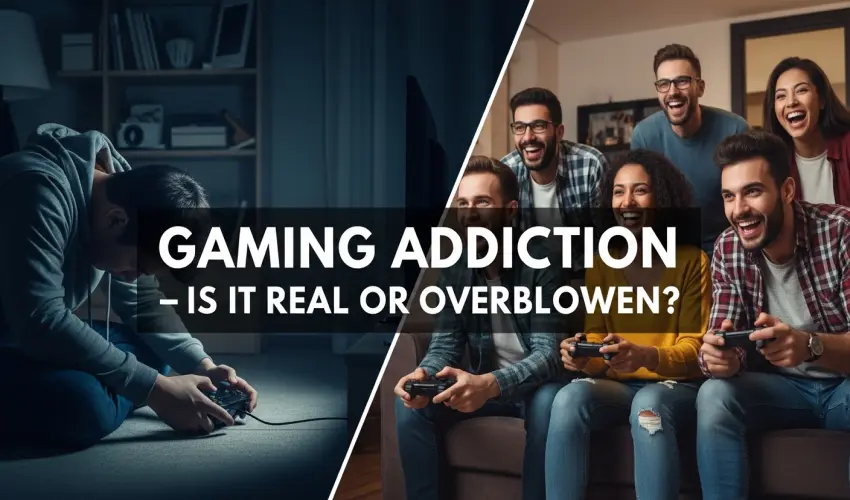Gaming Addiction – Is It Real or Overblown?
Published May 30, 2025
1 0
Key Takeaways
-
It's a Real Disorder: Gaming addiction, officially recognized as "Gaming Disorder" by the World Health Organization (WHO), is a real mental health condition, but its prevalence is often exaggerated in mainstream media.
-
Strict Criteria: A diagnosis requires extreme, long-term behavior that significantly impairs a person's life; it's more than just playing a lot.
-
Passion vs. Problem: It's crucial to differentiate between high engagement (a healthy, passionate hobby) and true addiction (a compulsive, harmful behavior).
-
Real-World Consequences: Genuine gaming addiction can lead to serious real-world problems, such as poor sleep, failing grades, job loss, and social isolation.
-
Underlying Issues: Compulsive gaming is often a symptom of underlying psychological issues like depression, anxiety, ADHD, or low self-esteem.
-
Balance is Key: Positive, healthy habits and early intervention—not fear-based narratives—are the most effective approaches for parents, educators, and players.
Introduction: The Gaming Addiction Controversy
With over three billion people playing video games worldwide, a contentious debate has ignited: is gaming addiction a real psychological disorder, or is it just media hype? We see stories of excessive screen time, late-night gaming sessions, and abandoned responsibilities. But is this truly addiction, comparable to gambling or substance abuse? Or are we misdiagnosing passion and escapism as a pathology?
This article will examine both sides of the debate, using science and psychology to answer the question: is gaming addiction real, or are we overblowing it?
1. What is Gaming Disorder? The Official Definition
In 2019, the World Health Organization (WHO) officially recognized "Gaming Disorder" in its International Classification of Diseases (ICD-11). It is defined as a pattern of persistent or recurrent gaming behavior characterized by:
-
Impaired control over gaming: (e.g., onset, frequency, intensity, duration, termination, context).
-
Increasing priority given to gaming: To the extent that gaming takes precedence over other life interests and daily activities.
-
Continuation or escalation of gaming: Despite the occurrence of negative consequences.
For a diagnosis, this behavior pattern must be severe enough to result in significant impairment in personal, family, social, educational, or occupational functioning for at least 12 months.
2. How Common Is Gaming Addiction, Really?
Estimates on the prevalence of gaming disorder vary widely, which is part of the controversy.
-
The WHO estimates that 3–4% of gamers worldwide may have the disorder.
-
Other academic studies suggest that less than 1% of the gaming population meets the full clinical criteria for addiction.
-
However, a larger portion, around 10–15% of gamers, may exhibit some form of problematic use that negatively impacts their life without qualifying as a full-blown disorder.
It’s crucial to remember: not all excessive gaming is addiction. Many people play for several hours at a time without any negative impact on their lives.
3. High Engagement vs. True Addiction
One of the core issues in this debate is distinguishing between a healthy, passionate hobby and an unhealthy, compulsive one.
High Engagement (Healthy Passion)
-
Loves playing for long hours but still balances life, school, work, and relationships.
-
Enjoys gaming as a primary hobby but maintains other interests.
-
Uses gaming for entertainment, socializing, and skill-building.
-
Can stop playing when needed without distress.
Addiction (Unhealthy Compulsion)
-
Neglects critical responsibilities like school, work, or hygiene.
-
Uses gaming as an escape to avoid real-world problems or negative emotions.
-
Is unable to reduce playing time, even if they want to.
-
Feels irritable, anxious, or angry if they can't play.
4. The Psychology Behind Compulsive Gaming
Gaming addiction is rarely just about the game itself. It's often linked to underlying psychological or neurological factors.
Common Psychological Triggers:
-
Anxiety and Depression: Gaming offers escapism and a sense of control that can be a reprieve from real-world stress.
-
ADHD: The fast-paced, high-stimuli nature of many games can be particularly engaging for reward-seeking and impulsive minds.
-
Social Isolation: Online games can provide a much-needed sense of community and validation for those who feel lonely.
-
Low Self-Esteem: Games offer clear goals, achievements, and a feeling of competence that may be lacking in real life.
Neurologically, gaming stimulates the brain’s dopamine reward system, similar to other addictive behaviors. However, dopamine release alone doesn't cause addiction; context, personality, and environment play a huge role.
5. Warning Signs of Gaming Addiction
If you're concerned about your own habits or someone else's, look for a persistent pattern of these signs:
-
Neglecting personal hygiene, meals, or sleep.
-
Declining performance at school or work.
-
Lying about the amount of time spent gaming.
-
Isolating from friends and family to play more.
-
Extreme irritability or anger when interrupted.
-
A loss of interest in other hobbies and activities.
-
Physical ailments like chronic eye strain, back pain, or headaches.
If these symptoms persist and worsen over time, it may be time to seek professional help.
6. Gaming as a Symptom, Not the Cause
For many individuals, problematic gaming is a coping mechanism, not the root problem.
-
A teen struggling with social anxiety might turn to online games for connection.
-
Someone suffering from depression may find that gaming is the only thing that provides a sense of motivation.
In these cases, addressing the underlying issue—the anxiety or depression—is the key to resolving the compulsive gaming.
7. The Surprising Benefits of Healthy Gaming
While often blamed for addiction, gaming in moderation has proven cognitive and mental health benefits:
-
Improves attention, memory, and decision-making skills.
-
Provides a source of community and social support.
-
Promotes creative problem-solving and strategic thinking.
-
Can reduce anxiety and stress in casual and simulation games.
Gaming itself is not inherently good or bad; the context and the user's control over it determine its impact.
8. How to Get Help
If gaming has become a clinical problem, evidence-based treatments are available:
-
Cognitive Behavioral Therapy (CBT): Helps individuals identify triggers, develop healthier coping mechanisms, and build a more balanced routine.
-
Digital Detox Plans: Involves gradually reducing gaming time while increasing alternative activities like sports, hobbies, or socializing.
-
Support Groups: Communities like Game Quitters and Reddit’s r/StopGaming offer peer support and shared experiences.
-
Family Therapy: Especially effective for adolescents, this can help rebuild communication, trust, and healthy boundaries at home.
The Bottom Line: Real, But Rarer Than You Think
Gaming disorder is a real condition, but it is not as rampant or as simple as media headlines often suggest. A small percentage of the gaming population suffers from a genuine, diagnosable disorder. The vast majority of players, even those who game for many hours a week, are not addicts.
The answer isn’t fear or blanket restrictions. It’s education, moderation, and empathy.
Conclusion: It's All About Balance
Video games can be immersive, enriching, and even life-changing. But like any powerful tool, they require self-awareness, balance, and boundaries. Gaming addiction is real for a few, but for the vast majority, games are a source of joy, challenge, and connection. The true challenge lies in knowing when healthy fun crosses the line into harmful compulsion.
Instead of asking, “Are video games dangerous?” the better question is:
“How can we game smarter—and live better?”







